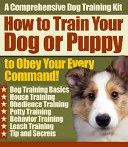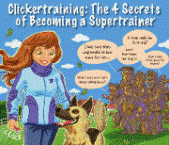Good Dog Training Advice
Get Fast & Simple Dog Training Tips to
Turn a Difficult Dog Into an Obedient Pet!
Stop Your Dog Pulling the Leash
Tell me if this sounds familiar. You get home from work, greet your furry friend and then go to snag the leash. The dog immediately starts running in circles and jumping up and down. You get them outside and they practically pull your arm out of its socket on a b-line to whatever it is they smell. You smile sheepishly to the neighbors, pull back a bit on the leash and try to get the dog to slow down - but no way, fido is on a mission and there's nothing you can do to stop him. This is how most people start their walks with their dogs. And it tends to turn a walk into a chore more than something enjoyable for owner and dog alike. The result is a dog that doesn't get enough exercise and an owner who is embarrassed to take their dog out the front door. Stop the Behaviour Dogs pulling on their leashes are not new. After all, a dog is not genetically bred to have their throat wrapped in a collar and tied to your arm. They pull because you're pulling back, and the only real way you'll ever get them to stop is to train them that the walk isn't going anywhere until they slow up. I've seen hundreds of dogs with this problem and the vast majority simply didn't know what they were doing wrong. They're not trying to assert dominance by running in front. They're not trying to make you mad. They're just excited and want to smell everything they can. That's why you need to take control of the situation. Like anything in your dog's life, it's your job to control what they have access to and when they have access to. By showing your dog how their behaviour hinders their walk (rather than yelling, which only confuses them), you'll solve a lot of dog behavior training problems. Revise the Walking Ritual To be effective in revamping your dog's walking behaviour, you need to start with the moment you pick up that leash. As you may have noticed, your dog learns very quickly what behaviours on your part signal that they're about to go outside. You need to take control of this situation because it sets up their reactions for the next few minutes on your walk. If your dog decides they are going to jump around and whine in excitement before a walk, wait until they calm down. Simply waiting 5-10 minutes will often drain them of that over exuberance. I know it's cute, but it's hard to control a dog that gets very excited. Before you even open the door, make sure they are sitting in a quiet, calm position. From there, don't do anything until they're waiting patiently. Once you get outside, let them relieve themselves right away, but then take control and limit their exploration. Because a dog pulls back when they are restrained, you cannot teach them to stop pulling by pulling back. You need to stop walking and make them sit, beside or behind you. It can take a long time, but if you stop the dog from walking every time they start to pull, they'll quickly learn that the act of pulling on the leash stops the walk. This is important. They need to recognize that the pulling action is causing the stoppage. Anything else will be too complex for them. Once you've done this, you should be able to slowly work them up to walking beside or even behind you on your walk - both things that will make your life infinitely easier out there. Take treats with you as well. It can make the process much easier if you can reward them for good behaviour.
=> http://ebook.gooddogtrainingadvice.com
| ||
|


Discover the Secrets to Training Your Dog Or Puppy. Huge BONUSES for a limited time only!
Click here now...
|
http://GoodDogTrainingAdvice.com






